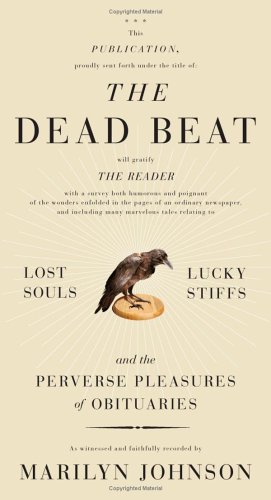Where does author Marilyn Johnson find secrets to living your best life? In the obituaries. Yes, the obituaries.
She has written for Life magazine, and has been an editor for Esquire and Redbook. But her heart is in following and writing obits. She has written obits for Princess Diana, Jacqueline Onassis, Katherine Hepburn, Johnny Cash, Bob Hope and Marlon Brando, to name a few.
However, The Dead Beat is not a collection of great obits. Instead, it takes us into the world of obits. Johnson captures you right from the beginning when she lists some amazing coincidences when it comes to timing of deaths. Take for example, John Adams and Thomas Jefferson died “in harmony on July 4, exactly fifty years after they signed the Declaration of Independence.” Or how the editor in chief of the Bulletin of Atomic Scientists and the lead guitarist of the rock group called the Blasters died on the same day. Seriously!
You’ll journey into inside how we finally get to know things about famous people once they are gone. One that has stuck with me is that Rosemary Clooney, a staunch supporter of RFK, was standing next to him when he was shot. She was never the same.
Readers also learn about the fascinating home of the best obits—where they dominate in quantity and quality, and get to know the best obituary writers, including Jim Nicholson, who found “something extraordinary to say about more than 20,000 ordinary Philadelphians.”
We also get way inside what it takes to be a great obit writer. The best see through all of the information to the essence, to that “moment in a life that’s the key or the facet of the personality that is the key to the whole person.”
We learn why the stigma once attached to writing obits is fading, and how they have come to be a respected literary form. Not just anyone can “…present a truly accurate version of an entire life in 20-30 newspaper inches.”
The Dead Beat also goes viral, and takes us beyond newspapers to the world of obits online. Johnson pulls us into obit sites and the millions that are addicted to this kind of encapsulized biography, blogs, forums, even sites that will instantly notify you when someone famous has died.
The Dead Beat brings home how obits do something that is so very special—they celebrate “the extraordinary in the ordinary person.” And the good ones move us, teach us, and make sure we know how those who we never heard of touched the lives of many.
As obit writer Jim Nicholson said, “Some people read obits to look for the secret to a successful or happy life.” Ironically, through the creative doors of death, obits can be a spiritual experience, as they can help us “live true” in our own lives. If you have never been a reader of obits, I bet you will be after reading this book.


